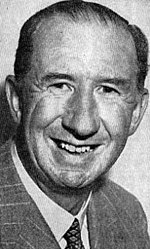|
 Nevil Shute
Norway
was both a popular novelist and a successful aeronautical engineer. He
used Nevil Shute as his pen name, and his full name in his engineering
career, in order to protect his engineering career from any potential
negative publicity in connection with his novels. Nevil Shute
Norway
was both a popular novelist and a successful aeronautical engineer. He
used Nevil Shute as his pen name, and his full name in his engineering
career, in order to protect his engineering career from any potential
negative publicity in connection with his novels.
Born in
Somerset Road, Ealing, London, he was educated at the Dragon School,
Shrewsbury School and Balliol College, Oxford. Shute's father, Arthur
Hamilton Norway, was the head of the post office in Dublin in 1916 and
Shute was commended for his role as a stretcher bearer during the Easter
Rising. Shute attended the Royal Military Academy, Woolwich but because of
his stammer was unable to take up a commission in the Royal Flying Corps,
instead serving in World War I as a soldier in the Suffolk Regiment.
By
the outbreak of World War II, Shute was already a rising novelist. Even as
war seemed imminent he was working on military projects with his former
Vickers boss Sir Dennistoun Burney. He joined the Royal Naval Volunteer
Reserve as a sub-lieutenant and quickly ended up in what would become the
Directorate of Miscellaneous Weapons Development. There he was a
department head, working on secret weapons such as Panjandrum, a job that
appealed to the engineer in him. His celebrity as a writer caused the
Ministry of Information to send him to the Normandy landings on 6 June
1944 and later to Burma as a correspondent. He finished the war with the
rank of Lieutenant-Commander, R.N.V.R.
In 1948, after World War II, he flew his own Percival Proctor light
airplane to Australia. On his return home, concerned about the general
decline in his home country, he decided that he and his family would
emigrate and so, in 1950, he settled with his wife and two daughters, on
farmland at Langwarrin, south-east of Melbourne.
In the 50s and 60s he was one of the world's best-selling popular
novelists, although his popularity has declined.[3] However, he retains a
core of dedicated readers who share information through various web pages
such as The Nevil Shute Foundation.
He had a brief career as a racing driver in Australia between 1956 and
1958, driving a white XK140 Jaguar. Some of this experience found its way
into his book On the Beach. Many of his books were filmed,
including Lonely Road, Pied Piper, On the Beach (in
1959 and also in 2000), No Highway (in 1951) and A Town Like
Alice (in 1956). The latter was adapted as a miniseries for Australian
television in 1981.
Shute lived a comfortable middle class English life, during a period, from
the turn of the nineteenth century to past the middle of the twentieth,
when class was a predominant factor in life. His heroes tended to be
middle class: solicitors, doctors, accountants, bank managers. Usually,
like himself, they had enjoyed the privilege of university, not then the
purview of the lower classes. However (as in Trustee from the Toolroom),
Shute valued the honest artisan, his social integrity and contributions to
society, more than the contributions of the upper classes.
Shute died in Melbourne in 1960.
From
www.wikipedia.org
[ Summary - On the Beach ]
[Return to APOCALYPTIC FICTION home page]
|
